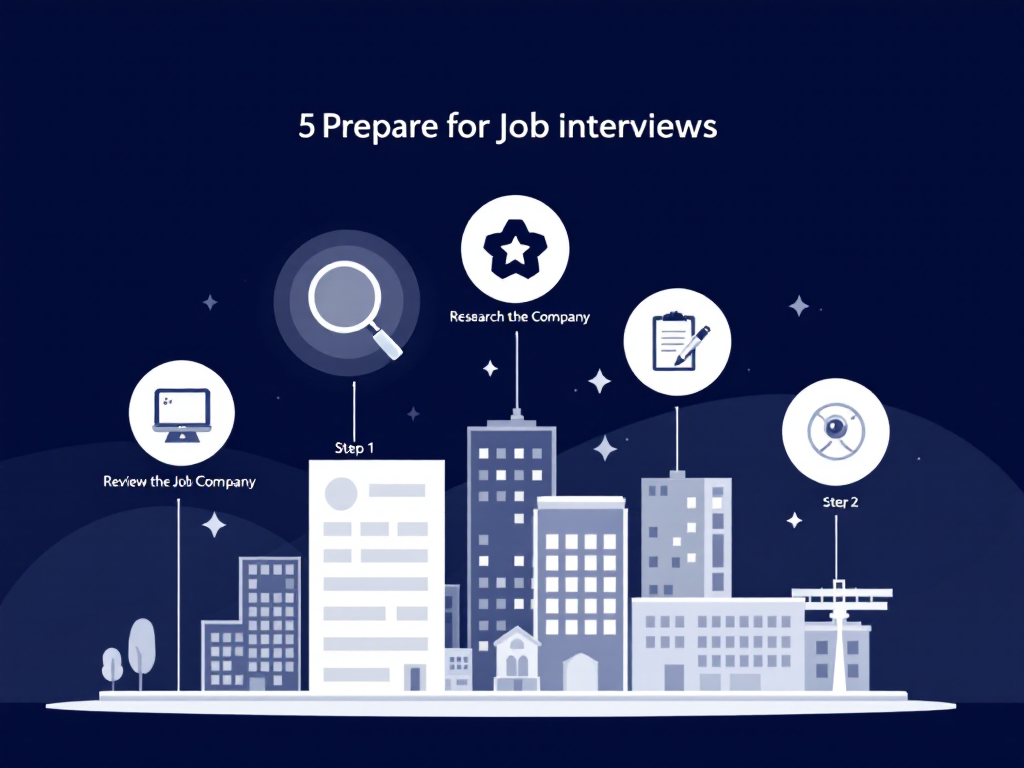
How to Prepare for Job Interviews: 5 Key Steps
Introduction: The Job Interview Journey
Imagine Sarah, a diligent marketing professional, as she sits in her living room, surrounded by a flurry of notes and a laptop displaying the company website. Tomorrow, she has an interview for her dream job, and a mix of anxiety and excitement courses through her veins. Like many candidates, Sarah grapples with the pressure of making a great impression while battling the inevitable nerves of the interview process. Her journey is one that many job seekers can relate to—a journey full of preparation, anticipation, and the hope of success.
Real-World Context & Personal Reflection
Understanding the Role
One of the first steps Sarah takes in her preparation is to thoroughly understand the role she's applying for. This involves dissecting the job description, identifying key responsibilities, and aligning them with her own experiences. Sarah recalls a previous interview where she misunderstood the role, leading to an awkward exchange that cost her the opportunity. This time, she's determined not to make the same mistake. By mapping her skills to the job requirements, she not only boosts her confidence but also ensures she can clearly articulate how she can contribute to the company.
Researching the Company
Equally important is researching the company itself. Sarah spends hours on the company’s website, reading up on their mission, values, and recent projects. She knows that understanding the company's culture will help her tailor her responses to align with their ethos. Reflecting on a past experience, Sarah remembers how her lack of company knowledge once led to a missed opportunity. This time, she prepares insightful questions that demonstrate her genuine interest in becoming part of the team.
Core Insights & Practical Takeaways
As Sarah delves deeper into her preparation, she employs several effective strategies that have proven beneficial in the past:
- Conducting mock interviews with a friend to simulate the interview environment and practice articulating her thoughts clearly.
- Avoiding the pitfall of over-relying on memorized answers, which can make her seem robotic. Instead, she focuses on understanding the underlying principles of her responses.
- Highlighting her relevant skills and experiences that are directly applicable to the role, ensuring she stands out as a strong candidate.
Practical Takeaway: Be adaptable and genuine in your responses, and use mock interviews to build confidence and fluency.
Success or “Aha” Moment
In a previous interview experience, Sarah had what she describes as an "aha" moment. During a particularly challenging question, instead of panicking, she recalled a project where she successfully turned around a failing campaign. The project initially struggled due to unforeseen market changes, which had drastically altered consumer behavior and preferences. Many in her team felt overwhelmed by the sudden shift, but Sarah saw it as an opportunity to dive deeper into data analytics—an area she was passionate about.
She leveraged her analytical skills to identify the core issues, focusing on the discrepancies between the anticipated and actual market responses. By conducting a comprehensive analysis of consumer trends and feedback, she pinpointed the elements that were not resonating with the target audience. Sarah then implemented a strategic plan that revitalized the campaign. This involved reallocating resources towards digital marketing channels that were underutilized, rebranding certain aspects of the product to better align with consumer interests, and introducing a feedback loop to continually assess market reactions.
By confidently sharing her story during the interview, she not only answered the question but also showcased her ability to adapt and problem-solve. Her narrative demonstrated her capacity to remain composed under pressure, think critically, and innovate solutions. The interviewers were particularly impressed by her initiative to go beyond the surface-level issues and address the root causes. This moment of clarity resulted in her landing the job, reinforcing the importance of being adaptable and genuinely engaged during interviews.
Furthermore, her experience highlights the value of drawing on past successes to illustrate one's skills and strengths in real-world scenarios. For instance, Sarah emphasized how her proactive approach and resilience not only saved the campaign but also led to a significant increase in customer engagement and sales, exceeding original projections by 30%. Her story serves as a powerful reminder to candidates about the importance of self-reflection and the ability to articulate one's achievements effectively. By turning a potential setback into a success story, Sarah underscores the critical role that adaptability and creativity play in professional growth and success.

Career & Interview Insights
Presenting Your Experience
One of the key aspects of interview success is effectively presenting past experiences. Sarah learns to structure her responses using the STAR method (Situation, Task, Action, Result). This approach allows her to clearly communicate her achievements and the impact of her contributions. For example, when asked about a time she led a team project, she outlines the situation, her responsibilities, the actions she took to guide the team, and the successful outcome of the project.
Answering Behavioral Questions
Behavioral questions are a staple of interviews, designed to assess how candidates handle various situations. By preparing examples that highlight her problem-solving skills and teamwork, Sarah is ready to tackle these questions with confidence. For instance, when asked to describe a challenge she faced, Sarah recounts a time when she managed a tight deadline by effectively delegating tasks and prioritizing key objectives, resulting in a successful project delivery.
Expert Tip: Use the STAR method to provide structured and impactful answers to interview questions.
Conclusion & Reader Engagement
As Sarah reflects on her journey, she realizes that the key to interview success lies in thorough preparation, adaptability, and genuine engagement. By understanding the role, researching the company, practicing her responses, and showcasing her experiences effectively, she sets herself up for success. Her story serves as a reminder to job seekers that while interviews can be daunting, they are also an opportunity to shine and demonstrate their value.
We invite you to share your own interview experiences or ask questions in the comments below. If you're curious about leveraging these strategies for your career, reach out to OfferGenie for more guidance and resources.